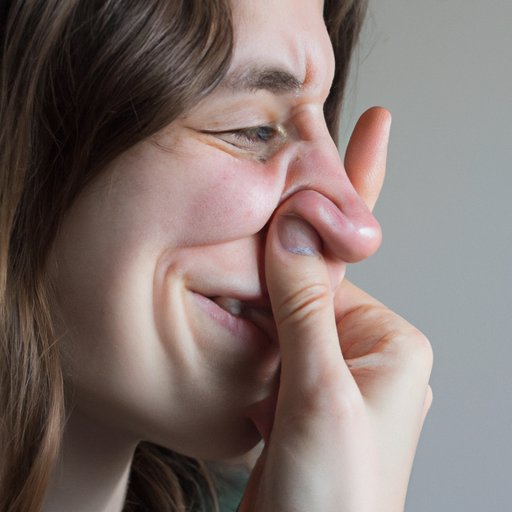
I. Introduction
A deviated septum is a common condition where the thin wall between the nasal passages is displaced, making breathing difficult and causing other health issues. Unfortunately, many people have misconceptions about it and believe that it can be easily fixed with simple home remedies. In this article, we will explore the truth about deviated septum and what you need to know about the available treatment options. We will also debunk some common myths about pushing a deviated septum back into place.
II. Understanding Deviated Septum: Causes, Symptoms, and Treatment Options
A deviated septum occurs when the cartilage and bone that divide the nasal cavity into two nostrils are not straight. Instead, they are displaced to one side, causing one nostril to be smaller and reducing airflow. This condition commonly happens due to injury, infection, or simply genetics.
The most common symptoms of a deviated septum are nasal congestion, difficulty breathing, frequent sinus infections, nosebleeds, and facial pain.
There are several available treatment options for a deviated septum, including medications, nasal sprays, and surgery. Medical professionals typically recommend non-surgical options first and may opt for surgery only in severe cases that negatively impact daily life and cannot be managed with other treatments.
III. Pushing a Deviated Septum Back into Place: Myths and Facts
Some people believe they can push a deviated septum back into place manually. However, this is a myth and not possible. Attempting to push your septum can cause a nosebleed, increased pain, and additional damage to the nasal passages.
If you suspect you have a deviated septum, it is essential to seek professional medical help. A doctor can perform a physical examination and suggest the appropriate course of treatment, which may include medication, nasal sprays, or surgery.
IV. Home Remedies for Deviated Septum: Things to Try Before Seeking Medical Help
While you should not attempt to push or manipulate your septum, numerous home remedies can alleviate symptoms and improve respiratory issues. Some natural remedies that may help include saline sprays, eucalyptus oil, steam inhalation, and humidifiers.
You can also try specific exercises like breathing and blowing techniques to help open up your nasal passages. Additionally, self-care tips like staying hydrated, avoiding allergens and smoking, and getting enough rest can help relieve symptoms.
However, it is crucial to note that these remedies should not replace medical treatments when necessary. If your symptoms persist or worsen, it’s essential to see a healthcare professional to avoid complications.
V. Seeking Medical Help for Deviated Septum: When to See a Doctor
It is appropriate to see a medical professional if your deviated septum symptoms are persistent and disruptive to your daily life. You might first consult a primary care physician or an ear, nose, throat specialist (ENT), who can evaluate your symptoms and suggest appropriate standardized tests like a CT scan of the sinus.
The doctor will then recommend an appropriate treatment option based on your diagnosis, which may include medications, nasal sprays, or surgery.
VI. Surgery for Deviated Septum: What to Expect Before, During, and After
If your symptoms are severe and you have not found relief from non-surgical treatments, surgery may be necessary. Deviated septum surgery (septoplasty) is a relatively straightforward outpatient procedure that takes about an hour to complete.
Before surgery, your doctor will administer general anesthesia, and you will not feel anything during the procedure. The surgeon will make small incisions in your nostrils to gain access to the deviated septum. Then, they will remove or reshape the cartilage to create a more open nasal passage.
After surgery, you may experience some discomfort, swelling, and nasal congestion. You’ll need to rest and avoid any activities that could put pressure on your nose. You may also need to avoid blowing your nose, wearing glasses, and taking a shower for a few days following surgery. The recovery duration will depend on the complexity of the procedure, but most patients can resume normal activities within two weeks or less.
VII. Preventing Deviated Septum: Tips for Maintaining Healthy Nasal Passages
You can maintain healthy nasal passages by adopting healthy habits like avoiding allergens, keeping your nose moisturized, washing your hands regularly, and getting enough rest. Additionally, avoiding putting any object into your nose and avoiding contact with the nose area will help reduce the risk of injury.
Maintaining a healthy lifestyle like staying physically active, following a healthy diet, and avoiding smoking can also help prevent deviated septum and other nasal issues. It is essential to maintain good hydration to keep your nasal passages moist.
VIII. Conclusion
A deviated septum can affect your quality of life and cause a range of symptoms. Although there are natural remedies and exercises that may help alleviate symptoms, it is crucial to seek professional medical help to determine the root cause and the appropriate treatment.
If medication and lifestyle changes are not working, or your symptoms are severe, surgery may be necessary. However, the majority of cases can be managed with non-surgical treatments like medication and nasal sprays.
Adopting healthy habits will also help prevent deviated septum from arising. It is essential to maintain good hydration levels, stay active, and avoid putting objects in your nose to preserve respiratory health.





